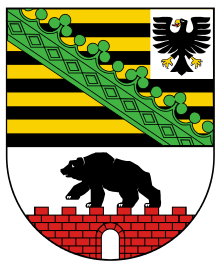Reiner Haseloff
| Reiner Haseloff | |
|---|---|
_09.jpg) | |
| Minister President of Saxony-Anhalt | |
|
Assumed office 19 April 2011 | |
| Preceded by | Wolfgang Böhmer |
| Personal details | |
| Born |
19 February 1954 Bülzig, East Germany |
| Nationality |
|
| Political party | CDU |
| Alma mater |
Dresden University of Technology Humboldt University of Berlin |
| Religion | Roman Catholicism |
| Website |
www |
Reiner Haseloff (born 19 February 1954 in Bülzig, Kreis Wittenberg, Bezirk Halle) is a German politician and the 6th Minister President of the federal state of Saxony-Anhalt.[1] A scientist like Chancellor Angela Merkel, he was widely considered as one of her closest party allies,[2] but distanced himself from her during the European migrant crisis.[3]
Political career
From 2002 to 2006, Haseloff served as State Secretary at the State Ministry for Economic Affairs and Labour under minister Horst Rehberger in the first cabinet of Minister-President Wolfgang Böhmer. In 2006, he succeeded Rehberger and became a member of Böhmer’s second cabinet.
In the negotiations to form a coalition government of the Christian Democrats (CDU together with the Bavarian CSU) and the Free Democratic Party (FDP) following the 2009 federal elections, Haseloff was part of the CDU/CSU delegation in the working group on labour and social affairs, led by Ronald Pofalla and Dirk Niebel.
Minister-President of Saxony-Anhalt, 2011–present
When Böhmer announced his resignation ahead of the 2011 state elections, Haseloff was the candidate of the CDU. He had already gained national attention by proposing that unemployed people who had no job prospects work for the public interest, a plan that since then has been adopted in a number of federal states.[4]
During the European migrant crisis, in November 2015, Haseloff kept distance to Angela Merkel by proposing an "upper limit" (German: Obergrenze) of refugees as the CSU party did, for the state as well as on federal level.[3] At the same time he didn't join a proposal of fellow CDU 2016 state election campaigners Julia Klöckner and Guido Wolf for flexible daily quotas for refugee inflows into Germany, which was a step beyond Merkel’s "open-doors" policy but not as far as the CSU party, reportedly in deference to his SPD coalition partner in the state government. Haseloff said, the chancellor "elaborately fought for an European solution" in the refugee crisis, but this was "out of sight".[5]
In the 2016 state elections, Haseloff was able to keep power in Saxony-Anhalt, with his CDU taking approximately 29 percent of the vote[6] and thereby remaining the largest party in the state parliament,[7] but faced a strong AfD right wing opposition. Haseloff stated after the elections that "the actual rise, which came for the AfD in the polls has a city name: It's Cologne."[8] He explained that the rise of the votes for his party in the state came because "we at least did nothing wrong as a Christian Democratic Union here in Saxony-Anhalt."[8] Following the elections, Saxony-Anhalt became the first of the German states to be governed by a triple coalition of CDU, SPD and the Green Party. On 25 April 2016 Haseloff was re-elected in parliament as minister president of the state during a second ballot, where he managed to gain one vote more than the coalition majority.[9]
Role in national politics
Haseloff has been part of the CDU’s national leadership team around chairwoman Angela Merkel since 2008. He served as a CDU delegate to the Federal Convention for the purpose of electing the President of Germany in 2009, 2010 and 2012. In the negotiations to form a so-called Grand Coalition under Chancellor Merkel following the 2013 federal elections, he was part of the CDU/CSU delegation’s leadership team.
As one of the state's representatives at the Bundesrat, Haseloff serves on the Committee on Foreign Affairs.
Other activities
- Deutsches Museum, Member of the Board of Trustees
- Committee for the preparation of the Reformation anniversary 2017, Member of the Board of Trustees
- European Chemical Regions Network (ECRN), President (2006-2011)
- International Building Exhibition (IBA) Urban Redevelopment 2010, Member of the Board of Trustees[10]
Distinctions
-
 Holy See: Knight of the Order of the Holy Sepulchre (2003)
Holy See: Knight of the Order of the Holy Sepulchre (2003)
References
- ↑ "Haseloff übernimmt das Amt des Ministerpräsidenten". Der Tagesspiegel. 20 April 2011. Retrieved 21 April 2011.
- ↑ Stefan Nicola (October 2, 2014), Battery Storage Targeted by German State That Built Solar Bloomberg Business.
- 1 2 „Wir sollten die Grenze für Flüchtlingszahl beziffern“ , Frankfurter Allgemeine, in German
- ↑ Lutz, Martin; Uwe Müller (3 February 2011). ""Es geht nicht um Schuhgrößen". Ein gewagter Schritt: Reiner Haseloff will in Sachsen-Anhalt Landesvater Böhmer nachfolgen". Die Welt. Retrieved 21 April 2011.
- ↑ Flüchtlingskrise: CDU-Wahlkämpfer wenden sich von Merkel ab, Der Spiegel, in German
- ↑ Janosch Delcker (March 13, 2016), Angela Merkel’s conservatives lose two major regional elections Politico Europe.
- ↑ Philip Oltermann (March 14, 2016), Germany 'won't change policy' after gains for anti-refugee AfD party The Guardian.
- 1 2 "Haseloff (CDU): "als christlich-demokratische Union hier in Sachsen-Anhalt nichts falsch gemacht"" [Haseloff (CDU): "As a Christian Democratic Union here in Saxony-Anhalt done nothing wrong"]. Phoenix (in German). Retrieved 14 March 2016.
- ↑ Haseloff erst im zweiten Anlauf wiedergewählt, Frankfurter Allgemeine, in German
- ↑ Board of Trustees International Building Exhibition (IBA) Urban Redevelopment 2010.
External links
| Wikimedia Commons has media related to Reiner Haseloff. |
| Preceded by Wolfgang Böhmer |
Minister-President of Saxony-Anhalt 2011 |
Succeeded by incumbent |

